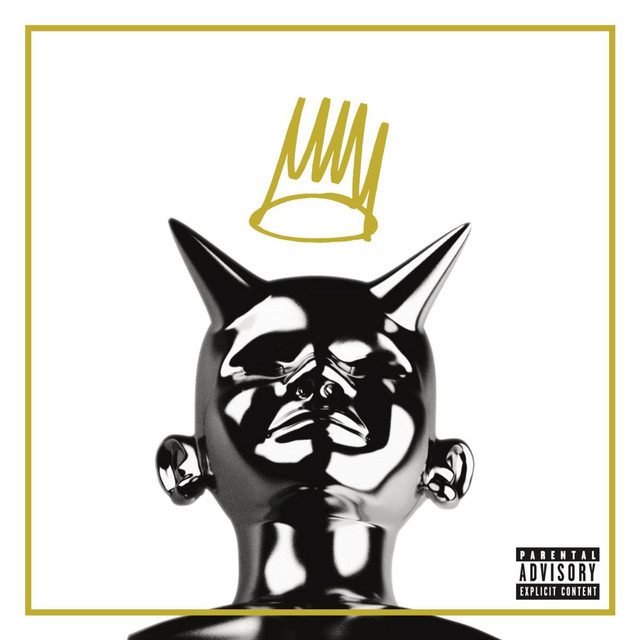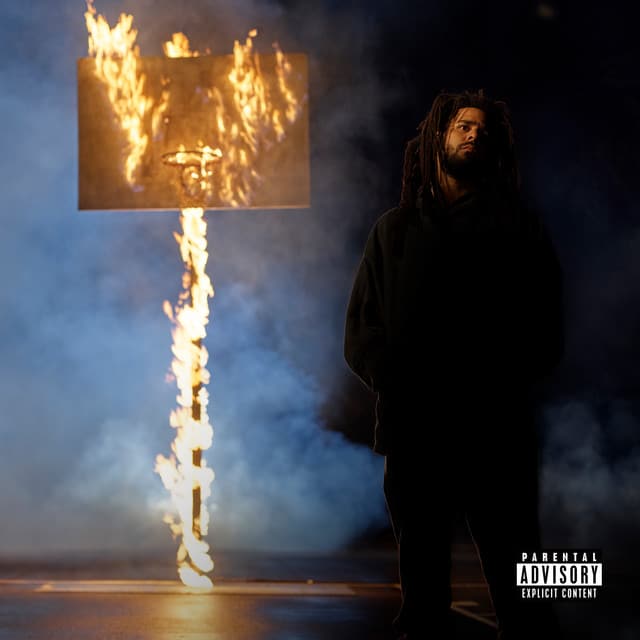Word, J. Cole’s “2014 Forest Hills Drive” ain’t just an album, it’s a whole journey. This cat bares his soul on this one, spittin’ real stories about his life, the struggles, and the come-up. He ain’t afraid to get personal, and that’s what makes it hit on a different level.
This record takes its name from his childhood home, so you know it’s about to get real. J. Cole paints pictures of growin’ up, heartbreak, and the pressure that comes with success. Tracks like “January 28th,” “A Tale Of 2 Citiez,” or “No Role Modelz” – the storytelling on those is legendary. This man ain’t just rappin’, he’s connectin’ with the fans on a whole other level.
Every single song on “2014 Forest Hills Drive” is fire. Cole goes deep, flexin’ his wordplay and droppin’ knowledge. “Fire Squad” tackles the state of the game, while joints like “03′ Adolescence” and “Love Yourz” are emotional and relatable. Each track got its own vibe, but they all fit together to tell the story.
So, here’s the deal: It’s time to rank those “2014 Forest Hills Drive” tracks. From “Intro” to the powerful “Note To Self,” we’re giving the power to the fans to decide which joint is the dopest.
1No Role Modelz
Dripping with a boss-like swagger and introspection. The track’s core revolves around the recurring mantra, “Don’t save her, she don’t wanna be saved,” underscoring the futility of changing someone who’s not interested in change themselves. Cole skillfully juxtaposes the chaotic nature of Hollywood and reality television stars with his longing for a genuine, soulful love – “dark skinned Aunt Viv love” that’s deeply steeped in a strong bond rather than fleeting physical attraction. Beyond the quest for authenticity in love, there are echoes of self-reflection, hinting at regret and a critical look at how far he has strayed from his roots since his rise to fame. Lines like “Before I was a B-list celebrity, before I started callin’ bitches ‘bitches’ so heavily” bear testimony to this evolution. A deeper layer reveals thoughts on his identity as a successful African-American male surrounded by societal expectations and pressures. All in all, “No Role Modelz” stands as a powerful, multifaceted narrative packed with cultural references, commentary on societal norms, and J. Cole’s personal introspection.
2Wet Dreamz
A deft portrayal of adolescent sexuality. The Fayetteville MC lyrically paints a vivid, almost cinematic picture of a young man’s first sexual encounter. The track’s narrative explores his infatuation with a girl from his math class – her brown skin, long hair, and humor that brightens up the dullest school day. Innocent crush soon escalates to visceral attraction, the ‘Wet Dreamz’ becoming increasingly hard to ignore.
J. Cole’s storytelling prowess is on full display here, as he grapples with the tension between fantasy and reality. The recurring refrain, “And I ain’t never did this before, no,” underscores his inexperience, fear, and vulnerability. Yet, in a twisted dance of teenage bravado, he postures himself as a ‘pro,’ hiding his virginity. The climax of the tale unravels in an awkward, yet poignant reveal – they were both sailing in the same boat, masking their vulnerabilities under a false veneer of experience. It’s a raw, honest tale that many can relate to, a testament to J. Cole’s ability to craft intricate narratives with universal appeal.
3G.O.M.D
An intricate weaving of the rapper’s frustrations and ambitions. Cole’s bars touch on the themes of fame, identity, and the realities of life in the rap game. The tracks kicks off by planting Cole’s authenticity with declarations that he put his city on the map, referencing his journey from Fayetteville, North Carolina, to Hollywood. Cole doesn’t shy away from expressing his frustration with the industry, cleverly using Anna Mae (Tina Turner) as a metaphor for his desire to maintain his integrity amidst pressures of the game.
On a deeper level, “G.O.M.D.” examines Cole’s struggle with his dual persona—the Hollywood star “Hollywood Cole” and the ordinary guy from Fayetteville, “Jermaine”. He presents hard-hitting introspection of fame’s toll, crying out for a return to simpler times. The hook, “Get off my dick,” acts as a defiant outcry against those seeking to leech off his success.
The song concludes by challenging racial stereotypes and asserting his status as a top rapper in the industry, wordplay dancing over the line between braggadocio and critical social commentary. All in all, “G.O.M.D.” offers an unflinching, nuanced look into J. Cole’s psyche while highlighting his superior lyrical prowess and depth.
4Apparently
Delving deep into the pool of his own consciousness, painting a vivid picture of his experiences and struggles, as the track invites us into an intimate conversation where Cole addresses the duality of fame, his familial regrets, and the faith that holds him together. He confesses about being unfaithful and admits the selfishness in his pursuits of success, laying bare his remorse for the difficulties his mother faced back home. He’s seeking redemption and self-improvement, pledging to better treat the people he loves.
Simultaneously, Cole does some clever braggadocio, unapologetically touting his lyrical prowess and his impact on the game. The watch line is slick; he’s not just another rapper flashing a timepiece – he’s got the Audemars, a signifier of status. The track ends on a resilient note with Cole affirming his faith and aspirations, a subtle reminder that even amidst turbulence, he’s strapped with wings, ready to fly. “Apparently,” is ultimately an introspective journey, marking Cole’s grappling with his own demons, while celebrating his irreplaceable place in hip-hop.
5Love Yourz
Throwing a beam on the rap game’s materialistic chase and how it’s become a distorted measure of success. The lyrics are a maze of raw, real-world experiences, painting a picture of his journey from a struggle-filled adolescence to the heights of fame. The narrative balances the highs of success against the lows of sacrifice, reinforcing that there’s truly no life better than the one you got, irrespective of its imperfections.
The song strikes at the core of the glitz-blinded hip-hop culture, reflecting on the deceptive allure of fame and riches. The words are soaked in wisdom, urging listeners to value their lives, their journeys, and their victories, and not fall into the endless pit of comparison. A key theme is appreciating what you have while you have it – your struggles, your journey, your people – because in the end, they mold you into who you are. Cole’s lyrics are unarguably profound, an introspective look at a fast-life illusion, throwing the ultimate wisdom – love yours.
6A Tale Of 2 Citiez
Flexing his storytelling muscles, laying down an intricate narrative about the struggles of life in the inner city. Central to the track is the concept of duality – the dream of wealth juxtaposed with the harsh realities of achieving it. The song navigates the vine-tangled streets of the ‘Ville,’ arguably a double entendre for both Fayetteville, North Carolina, his hometown, and the ‘villains’ engulfed in nefarious activities within it.
He paints a grim picture where the allure of a life shimmering with affluence pushes his characters towards dire choices. He rolls with intimate stories of ‘niggas’ who ‘never had things,’ forced to participate in robberies, reinforcing the desperate quest for material possession. A striking emphasis is how the glamorous life isn’t all it’s cracked up to be, indirectly critiquing the materialistic, superficial facets of contemporary hip-hop culture.
Peppered with gritty anecdotes, the repeated line ‘How could you know?’ drives a poetic punch – a rhetorical question addressed to the unsuspecting onlookers to the struggles embedded in the narrative. The song serves as a bleak reminder of an environment where dreams, like nightmares, can have a life-altering impact.
7Fire Squad
Presenting a raw critique of the rap industry and its underlying dynamics. This track stands as an energized battle cry, challenging the status quo and the concept of royalty in the hip-hop world. J. Cole’s lyrics dissect themes of ambition, fear, and self-doubt, while simultaneously asserting his claim to fame. Yet, he skillfully counters this proclamation with a humbling reflection on the ephemeral nature of power and fame.
Subtly referencing iconic figures like Ice Cube and Spike Lee, he positions himself within this lineage. Still, the most audacious commentary comes when he calls out the cultural appropriation in hip-hop, indirectly referencing artists like Elvis, Eminem, and Macklemore. Concluding on a contemplative note, he ruminates on the oneness of humanity, shifting from the claim of individual to collective royalty. With “Fire Squad,” J. Cole tackles grand narratives with his unflinching lyricism and incisive flow.
8St. Tropez
Possibly the most chilled out track the album, with its jazzy, soul-infused beat, Cole delves into a lyrical exploration of his dreams, fears, and struggles. The titular St. Tropez, a sun-soaked town on the French Riviera, symbolizes Cole’s aspirations for success and escape from his past. However, he captures the uncertainty and fear that comes with taking huge leaps, acknowledging his fear of flying, a metaphor here for climbing the heights of fame. Yet, he paints an unflinching picture of a determined dreamer on the brink of stardom, ready to head to Hollywood, signifyin’ the center of musical success. His repeating of “he’s bout to get paid” underscores the allure and inevitability of fame. Scars, wars, personal struggles, not being able to smile – Cole weaves these dark threads seamlessly into the narrative, creating a raw, melancholic, yet hopeful anthem for dream chasers everywhere.
9Intro
J. Cole kicks off his third studio album, ‘2014 Forest Hills Drive,’ with a deep dive into the universal quest for happiness and freedom on the track “Intro.” Cole uses the repetition of “Do you wanna be happy? Do you wanna be free?” as an almost hypnotic mantra throughout the song, invoking introspection, nudging the listener to question themselves. The simplicity of the lyrics belies a rich complexity. This is not just about personal ambition, it’s about a longing for liberation from societal constraints — “Free from bills, free from pills,” — and a yearning for breakthroughs amidst harsh realities — “Block gets shot, the streets is cold.” The lyrical journey through pain and resilience, with its contemplative mood, resounds as a clear echo of urban life. It’s Cole’s call-to-arms that sets the tone for the rest of the album, establishing its autobiographical, self-reflective narrative.
10January 28th
Named for the day he shares a birthday with the legendary Rakim, the North Carolina MC uses this cut to reflect on his status in the game, his journey, and the perils of fame. He’s out here tryna make a million off a rap tune, but beneath that ambition is an acute awareness of the industry’s pitfalls and pernicious influences. On one hand, he’s commenting on aiming high and the burden of carrying his city’s hopes. On the other, he’s meditating on life in his old ‘hood and the tragic loss of friends. He weaves in his admiration for Jay-Z while also offering a clear-eyed critique of societal issues. The track ends with a bold claim about his position in the pantheon of rap gods. The essence of this cut? It’s classic, conscious Cole – spitting bars steeped in humility and hubris, and delivering an introspective trip through his life and times.
1103’ Adolescence
Hard-hitting introspection into his own coming-of-age experiences. Struggling with self-doubt and insecurity, the rapper explores themes of social identity and the human condition. The lyrical narrative tells the story of a young Cole wrestling with his place in the world, trying to reconcile his ambitions with the harsh realities painted by his environment. He’s the underdog; he loves the “baddest girl in the city” but feels he’s not her type, watches the basketball stars from the sidelines, and grapples with the absence of his father. Yet, he dreams of escaping his circumstances, evading society’s ‘suit and tie’. It’s this deep-rooted self-awareness, introspection and authenticity that makes “03’ Adolescence” a standout track. J. Cole’s language paints an array of emotions – from vulnerability to defiance – showcasing the brutal honesty and rawness that he’s celebrated for. The song is a testament to his storytelling ability, offering a snapshot of his journey and evolution both as an artist and a man.
12Hello
J. Cole flips a salutation into a deep meditation on time, love lost, and personal regret. The lyrics weave a narrative of an old flame and their life together, punctuated by the simple, poignant refrain of “hello”. The track shows Cole wrestling with the path not taken, highlighted by the mention of his ex’s “newest kid”. It’s not just about romance though. The song becomes a mirror reflecting Cole’s struggle with instability and the weight of potential fatherhood, confronting the idea of being a stepparent when he’s barely got a home for his own. “Hello” echoes the classic themes of emotional regret and nostalgia, but Cole flips it with his candid introspection. The track uncovers another layer of complexity in the narrative fabric Cole stitches throughout ‘2014 Forest Hills Drive’, solidifying its place in the pantheon of hip-hop confessionals.
13Note To Self
This track is profound in its simplicity, yet loaded with deep truths and introspection. In its repetitiveness, Cole’s lyrics stress that nothing truly matters. Whether we’re talking about people, places, or circumstances, nothing holds any weight unless we assign it. It’s a brave confrontation against societal pressure and the human tendency to attach meaning to sensations, experiences, and interactions. Cole’s assertion, “I don’t mind ’cause you don’t matter / I don’t mind because I don’t matter”, taps into his exploration of selfhood, inviting listeners to introspect and understand their insignificance in the grand scheme of the universe. In the end, he emphasizes that love, an ancient and enduring force, is the only thing that truly matters. By ending the album this way, Cole pushes us to dwell on his lyrical wisdom and grapple with these philosophical notions of existence, meaning and love.









